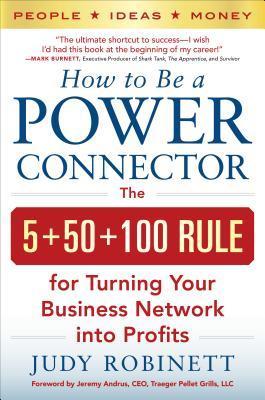How to Be a Power Connector Summary
6 min read ⌚
 The 5+50+100 Rule for Turning Your Business Network into Profits
The 5+50+100 Rule for Turning Your Business Network into Profits
Do you want to be successful?
Of course, you do!
A few decades old news flash:
Success is not just about having an innovative idea and some luck along the way.
It’s also about having a vast network.
And according to Judy Robinett, even that isn’t enough anymore!
Great networkers are a thing of the past; it’s about time you learned “How to be a Power Connector.”
Who Should Read “How to Be a Power Connector”? And Why?
“How to Be a Power Connector” is the book anyone who wants to learn how to build a stronger business network should read.
Consequently, it’s a must-read for those who want to climb the career ladder and improve their future prospects.
And because, ultimately, it tends to teach you how to be a more sociable person, it’s also about talented introverts who want to find a way to be successful in the dynamic business world of today.
 About Judy Robinett
About Judy Robinett
Judy Robinett, “the woman with the titanium digital Rolodex,” is a business thought leader and a long-time entrepreneur and corporate executive.
She has been on the advisory boards of Illuminate Ventures, Pereg Ventures, Springboard Enterprises, and Women Innovate Mobile (WIM).
In addition, she has been profiled in “Forbes,” “Huffington Post,” and “Bloomberg Businessweek.”
The bestselling “How to Be a Power Connector” is her only book so far.
“How to Be a Power Connector PDF Summary”
If you’ve ever watched a film about street gangs – or been in one – you’ve probably learned one of the fundamental rules of gang membership:
For better or for worse, once you’re in a gang, people tend to attach to you the deeds of the gang.
So, you’re either good or bad by reputation, inspiring fear or respect even if you’re very different from the rest of those in the gang.
Translate that in the world of business networking:
If you know Jeff Bezos – or even know someone who knows him – people tend to look at you differently and listen to your ideas with very different ears.
Put that in terms of a simple equation:
More powerful network = more personal power.
Or, as Judy Robinett puts it:
Skill is fine, and genius is splendid, but the right contacts are more valuable than either.
So, is your network strong enough to harness your skill and genius?
If you don’t know the answer to that question, ask yourself at least three other:
#1. What is the proportion of strategic relationship when compared to other network relationships? (This is called, strategic quotient, SQ, and it’s a very important metric)
#2. How many people do you talk on a regular basis, and how much value do these discussions add to your future prospects?
#3. How many people on your “networking wish list” are you connected with, and do you have a plan on how to connect with those you are currently not?
If your SQ is great, and you have all but few people left on your networking wish list – then you’re doing a great job as a power connector.
If not, it’s time you regroup and start building your network according to the 5+50+100 Rule:
Your Top 5: The Inner Circle
There should be only 5 people in the world that you are really close to and that you listen and talk to on a daily basis.
Normally, these are probably your parents, your spouse, your best friend and your business partners.
These are the people that are prepared to go to hell and back with you, and the people you won’t hesitate calling at 3AM even if you need some help to bury a body in the backyard.
Your Key 50: The Valuable Circle
This group consists of people you should contact on a weekly basis.
They are your friends and your close associates which are valuable to you, so you always try to add some value to their lives.
In time, it will certainly pay off.
Your Vital 100: The Business Circle
These are some of your more distant friends and occasional business acquaintances.
You like these people as well, but you have only 24 hours in a day, and 7 days a week – so you should contact your vital 100 about once a month.
You can’t afford (and don’t like) to lose them – but you don’t have time to add value to their lives as well.
However, your job doesn’t end with recategorization.
The catch is to choose wisely as well and build a deep and diversified network.
There’s no point in surrounding yourself with people who are like you – or are alike each other. So, if you are a Buddhist, find some Catholics to talk to once in a while; and if you are a Liberal, spend some time with a Democrat or two.
Next, find the right environment for your network.
Once again, there’s no point in having twenty publishing agents in your Key 50 if you are not planning to publish a book.
Concerning this, Steve Jobs – who else? – once offered new entrepreneurs great advice you should heed to: donate to the charities of the people you want to meet.
Because – well, you’ll help, and, as a bonus, you’ll be invited to their Christmas parties!
Key Lessons from “How to Be a Power Connector”
1. The 5+50+100 Rule
2. The 10 Character Traits of Power Connectors
3. The 4 Steps of Power Connecting
The 5+50+100 Rule
Want to build yourself a strong network?
Then follow the 5+50+100 Rule!
It’s fairly simple:
Set aside a group of 5 people – your Top 5 – you know you can trust come what may. Usually, these are your parents, your spouse, your best friend and your direct business associate. Call these people daily and help them whenever; they will help you back even if you don’t.
Your Key 50 should be a group of close friends and close associates. Call them at least once a week and try to add some value to their lives whenever possible.
Finally, your Vital 100 should be a group of distant business acquaintances you really like and whom you should call about once a month.
155 people – that’s the rule-of-thumb limit of your network!
The 10 Character Traits of Power Connectors
All power connectors share ten traits:
#1. Authentic: they are “genuine, honest, and transparent.”
#2. Trustworthy: they are dependable and have a great reputation based on their past results.
#3. Respectful: they are “appreciative of the time and efforts of others” and “treat subordinates with the same level of respect as they do supervisors.”
#4. Caring: “they like to help others succeed” and “have good hearts.”
#5. Listening: they ask beautiful questions, and they are authentically “eager to learn about others – what’s important to them, what they’re working on, what they’re looking for, and what they need.”
#6. Engaged: they actively take participation in life and are passionate about things.
#7. Patient: “they recognize that relationships need to be cultivated over time” and so, they invest time in maintaining them.
#8. Intelligent: they are not just skillful and smart, but also they are thoughtful and never burn bridges.
#9. Sociable: they are “nice, likable, and helpful.” In fact, most of them “enjoy being with people, and they are happy to connect with others.”
#10. Connected: “they are part of their own network of excellent strategic relationships.”
The 4 Steps of Power Connecting
Power connecting is a game of four stages.
It starts with preparation, which means making a 5+50+100 wish list of connections.
Then, you should move to targeting, or, in other words, actually finding ways to meet the people on your list.
Once you do, follow up – it’s crucial to recontact your targets within 24 hours.
Finally, connect your connections for the long run – be sure to add or create some value in their lives, and connect them to some other people from your circles.
Like this summary? We’d like to invite you to download our free 12 min app, for more amazing summaries and audiobooks.
“How to Be a Power Connector Quotes”
Business relationships are important for strong communities. Share on X
Be completely honest. Always own up to a mistake if you’ve made one. It’s more important to be nice than to be right. Share on X
When you deliver first-class work as a volunteer, people will assume you deliver the same high-quality work in your professional life. Share on X
Never burn bridges. People change—cut them some slack and be forgiving. Share on X
In the end, the most important thing will not be the titles you have held or the money you have made but the kind of person you have become. Share on X
Our Critical Review
The main premise of Judy Robinett’s book “How to Be a Power Connector” is that nowadays networking may be more important than both skill and genius – and that it is learnable.
Even if the former is not entirely true, business networking is still an essential part of modern life.
Use this book to become skilled at it.
It’s neatly organized and easily applicable – so you can start tomorrow!
Emir is the Head of Marketing at 12min. In his spare time, he loves to meditate and play soccer.


 The 5+50+100 Rule for Turning Your Business Network into Profits
The 5+50+100 Rule for Turning Your Business Network into Profits About Judy Robinett
About Judy Robinett




